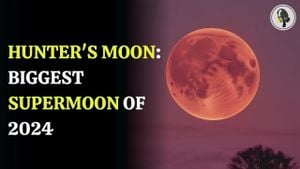Yale University is gearing up to introduce a unique course titled "Beyoncé Makes History: Black Radical Tradition, Culture, Theory & Politics Through Music," as part of its academic offerings starting next spring. This one-credit class aims to examine the musical and cultural legacy of the global icon Beyoncé, singularly spotlighting her influence and the narratives embedded within her work.
The course will be spearheaded by Daphne Brooks, the African American Studies professor who previously taught similar courses at Princeton University. Brooks, who is also co-founder of Yale's Black Sound & the Archive Working Group, expressed immense enthusiasm over the opportunity to devote a full course to Beyoncé’s oeuvre. “This is the first time I’ve been able to focus on the socio-political and intellectual evolution of Beyoncé’s work since her 2013 self-titled album,” she revealed.
Focusing on her album releases and how they resonate with historical and contemporary socio-political movements, Brooks intends to offer students insights not only from Beyoncé's musical contributions but also through the rich contexts of Black radical thought. The course will explore how Beyoncé's lyrics and performances address themes of race, gender, and the historical subjugation of African Americans, tapping deeply from intellectuals like Frederick Douglass and Toni Morrison.
“Can you think of any other pop musician who’s invited grassroots activists to participate in her multimedia album projects since 2013?” Brooks provocatively questioned, highlighting Beyoncé’s progressive approach to storytelling through music. Her concerts and music videos, which feature representations of activism, not only aim to entertain but also serve as powerful cultural commentaries.
Yale is not alone; the surge of academic interest surrounding pop culture figures is evident across universities nationwide. Some institutions have offered courses on other artist phenomena like Bob Dylan, Taylor Swift, and Lady Gaga, who have all shaped cultural discourse through their art. The excitement surrounding Brooks’ course reflects students’ eagerness to engage with contemporary cultural narratives and their socio-political dimensions.
Interestingly, Beyoncé's involvement with political issues — like performing at Barack Obama’s inaugurations and aligning with causes such as Black Lives Matter — amplifies her profile beyond mere pop star. Brooks intends to analyze these intersections, exploring how she uses her platform for advocacy and forging connections within marginalized communities.
The course is expected to draw significant enrollment, akin to the recent popularity of Taylor Swift-related classes, which saw around 300 students sign up when offered at Harvard. Brooks anticipates similar enthusiasm for her Beyoncé-focused class, yet she has expressed the intent to keep class sizes manageable.
With her vast repertoire, which includes 32 Grammy awards to date, Beyoncé's cultural footprint is undeniable. Her music is often described as steeped in historical memory, which Brooks finds fascinating, pointing out the lack of similar depth seen from other artists. Class discussions will likely examine how her artistic choices contribute to collective identities and cultural memory within the African American experience.
For those hoping to see Beyoncé live during the semester, Brooks playfully added, “It’s too bad because if she were on tour, I would definitely try to take the class to see her.”
This course not only exemplifies the rising trend within academia to explore the socio-political impacts of artists like Beyoncé but also emphasizes the significance of connecting music with historical contexts and movements. Through this lens, students will analyze how modern artists can shape discourse and consciousness, making the class not just about music, but about cultural legacies and the fight for social justice.
Starting spring 2025, Yale's new course on Beyoncé promises to be both enlightening and engaging, merging the realms of pop culture, politics, and academic thought.



